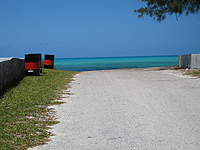
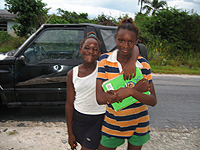
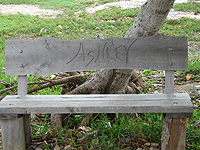
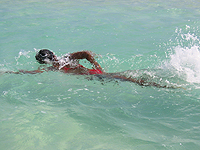
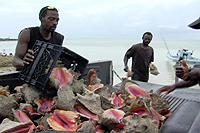
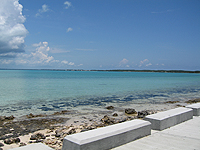
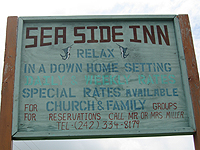
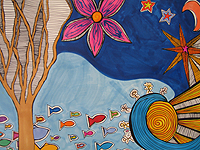
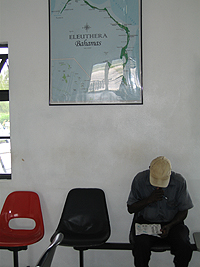
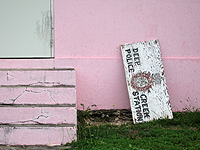

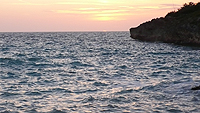 |
|
The Film
Synopsis
Free Swim is an award winning documentary film about the
paradox of coastal people not knowing how to swim. Taking place on the
island of Eleuthera in the Bahamas we follow a group of kids as they overcome
their fears, gain confidence and reconnect with their environment by learning
to swim in open waters. With fresh memories of a friend drowning and the
conflicts of growing tourism, for these kids it’s not just about floating,
but gaining new skills for their future.
Eleuthera, which means ‘freedom’ in Greek, is so long and narrow (approximately
110 miles long and on average 1 mile wide) that it’s like walking a tightrope
between two bodies of water. In close proximity to the US, the tourism
industry thrives in the Bahamas, but Eleuthera has experienced a cyclical
rise and fall of tourism, which coincided with the crash of pineapple and
cattle farming and increased stress on local seafood stocks. With its particularly
thin geography, bucolic landscape and stunning water, its culture is rooted
in a rural fishing vibe that holds family traditions dear in the face of
growing social-environmental conflicts. Free
Swim uses the topic of learning to swim as a way to explore more
complicated aspects of life on Eleuthera, such as influences on community
function by the media, drowning, tourism, overfishing, and education. This
multifaceted approach is essential to the development of the film’s theme
of paradox in paradise all the while using swimming as the anchor, literally
and metaphorically. The story thread is woven with footage of children
learning to swim in their backyard sea. Underwater footage shows the challenges
of learning to breathe in a new environment and the powers of discovering
a beautiful, new world. We see the Swim to Empower program in action. Swim
to Empower was founded by two young American women who traveled to
South Eleuthera, the most economically challenged part of the island, to
teach people of all ages to swim and moreover, to empower locals to teach
one another.
The documentary is shot in verite style following kids into the water classroom
for swimming lessons and empowerment. The behavioral and emotional dimensions
of the swimming students in/out and above/below the water are presented
together with elements of community dynamics, the island’s natural resources,
and socio-economic perspectives. The audience meets many characters including
teachers, artists, parents, and fishermen. All of the storylines combined
present a portrait of the social, environmental and economic issues on
the island and the impact it holds for the world at large. Through the
power of learning to swim the story promotes discussion about the swimming
gap and ignites broader questions about health and conservation: What might
be the unexpected power of learning to swim? What is at stake when people
are unable to connect with their environment beyond purely using it for
utilitarian gain? And, when we come to better understand our environment
will we value it, and ourselves, more? For many, swimming translates into
a new perspective – a “sink or swim” mixed with a “there’s no place like
home” sentiment – bringing a greater sense of freedom with the knowledge
that the underwater world exists and can be survived, and even enjoyed.
Recognizing that drowning is a leading cause of death for children globally
and that many questions exist about minorities and the swimming gap, Free
Swim is an empowering film that is relevant for a wide, international
audience and will be made available through film festivals, commercial
distribution, educational outreach programs, and television. It documents
the essence of daily life in a coastal world, avoiding both a romantic
vision of island lifestyle and an overly academic approach to environmental
and public health topics. While the documentary’s emotional trajectory
unfolds in a new island destination for many audience members, the process
of learning to swim allows viewers to tap into personal fears and have
an experience with the ocean. Learning to swim is a personal thing, which
is passed on from adult to child and is at the core of one’s identity and
development. The film appeals to swimmers and non-swimmers alike because
all humans have a relationship with water, and in particular to adults
and children who have memories of vacationing in coastal places. Despite
the different, immediate realities of life on Eleuthera, the characters
express similar concerns to people living in more developed locations. Free
Swim engages through the process of discovery, in and out of the
water, and aims to inspire viewers to question their own relationships
with the world, even in places located far from the ocean.
back to top
Director’s Statement
Free Swim grew out of personal adventures
and public health work with coastal people around the world. I
became aware of a paradox: many people, young and old, who live
surrounded by water, do not know how to swim. Having grown up in
the U.S. on Long Island, N.Y., I was aware of the questions about minorities
and the swimming gap and had wondered why some kids in my neighborhood
didn’t know how to swim.
Digging through the public health literature it was astonishing
to learn that drowning is the second leading cause of accidental death
for children globally. Looking closer, in the U.S. about 60% of ethnically
diverse children are unable to swim and African-American children drown
at three times the rate of Caucasian children. As a doctor with a
degree in public health and environmental science, specializing in water
and health, the more I learned about the struggling efforts to break this
cycle, the more I wanted to give this topic a voice, especially regarding
islanders who rely on the ocean directly, every day. With my belongings
in storage and my camera equipment on my back, I moved to Eleuthera, an
island of the Bahamas, in April 2006. I knew that this location was
the ideal setting because Swim
to Empower was giving lessons. And, with its particularly narrow
geography, bucolic landscape and dramatic blue water, the ocean feels very
big on Eleuthera.
I saw Free Swim as an immersive,
episodic story that peeled away the complicated social, environmental and
economic layers connecting swimming, island life, and the world at large. I
hoped that future viewers living far from the ocean could relate and question
their own relationships with water. While shooting the first summer,
I also envisioned locals telling a story through their own eyes so I recruited
sixty students for a photography project. Using underwater, disposable
cameras the mission for these students, many first-time photographers,
was simple: to explore the ocean's impact on their lives. With just a camera
and the support of their peers, children had a wide range of opportunities
to experience their surroundings directly and in a new way. The result
is documented in the book We, Sea. The
children's colorful images and personal words portray a vibrant, human
sensibility, conveying both the beauty and struggle of coastal communities.
Working on this paired film/book project has strengthened
my belief that the disconnection with one’s natural environment underscores
many of today’s global health challenges. Experiences in nature are a key
factor for people, especially children, becoming more expressive, attentive,
and simply put – healthier. My work strives to reveal a distinctive,
yet unifying perspective of humanity and nature, and searches for profound,
although perhaps simpler, connections to the complex world in which we
live. Some of my most encouraging times have been hearing the long
conversations created by the film Free Swim. Even
in urban America, the story of learning to swim in the Bahamas gets people
talking – about much more than expected.
back to top
|
|












